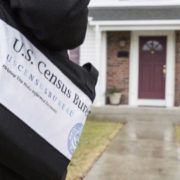The trial over the issue of whether people will be asked about their citizenship in the upcoming 2020 census began Monday, November 5, at a federal court in New York City. Advocates pushing for an accurate count maintained that the question will turn out a “systematic undercount” of immigrants who may refrain from responding out of fear data would be used against them.
The addition of the citizenship question was announced last March by U.S. Commerce Secretary Wilbur Ross, who in an eight-page memo said that the question on citizenship would help administer the Voting Rights Act (VRA) of 1965 which is supposed to prevent voter discrimination against of minorities.
The question though, has not been included in the decennial census since the VRA was passed into law, or in the past 70 years in total.
The Trump administration has added that the Constitution allows the government to decide how the census should be conducted, thus making the question addition lawful.
Advocates against the question—including the states of New York, Illinois, Iowa, and Virginia; and cities like New York and Philadelphia—maintained that the question would discourage a significant amount of people from participating in the census, thus making it possible for certain communities to be misrepresented.
“These well-documented risks of adding a person-by-person citizenship demand to the decennial census are heightened in the current political climate because of President Trump’s anti-immigrant rhetoric and this Administration’s pattern of policies and actions that target immigrant communities,” wrote the lawsuit plaintiffs.
Duke University political scientist Dr. Sunshine Hillygus on Monday, testified for the advocates by saying that the citizenship question “will lead to systematic undercount of Hispanic and non-citizen households” which is an issue advocates for an accurate count have already been addressing.
“A citizenship question is going to make conducting the census a heck of a lot more difficult,” said Dr. Hillygus.
The decennial count not only looks for population changes and other information about who makes up the United States—citizens and non-citizens alike—but more importantly, uses the derived data to address the nation’s needs like determining how seats in Congress are set, and how funding allocations for certain programs are made.
Over $600 billion is allocated through federal programs based on census data. Among the many programs dependent on the census are those regarding education, assistance for veterans, hospitals, and transportation.
Dr. Hillygus referred to recent reports showing how the Trump administration’s immigration enforcement tactics have led some eligible immigrants from participating in social programs. She also pointed to a recent Pew Research Center report that showed a majority of Latinos reporting fear that they, or a family member of close friend could be deported.
The trial commenced Monday after the U.S. Supreme Court last Friday, declined the Trump administration’s requests to postpone it.
The case which is led by New York Attorney General Barbara Underwood and is to be decided by federal Judge Jesse Furman, will most likely be appealed to the Supreme Court. (Rae Ann Varona /AJPress)






